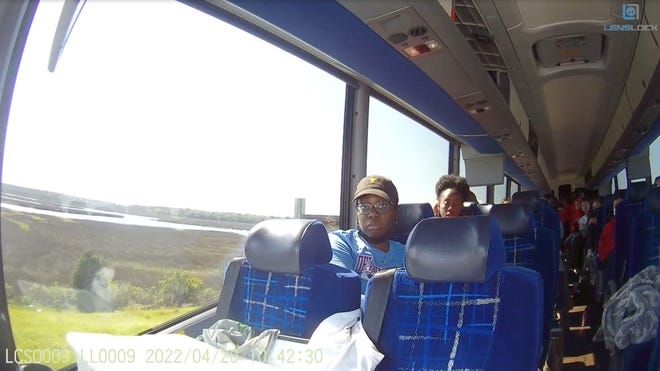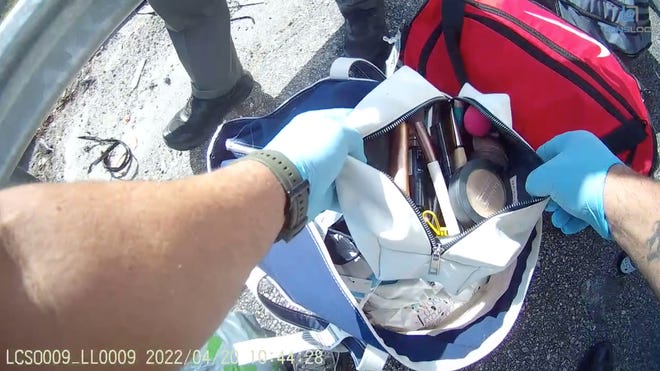Body camera footage from Georgia deputies who stopped a Delaware State University women’s lacrosse team bus late last month directly contradicts Tuesday statements by the sheriff who defended the stop.
In a public address, Liberty County Sheriff William Bowman said “no personal items on the bus or person(s) were searched” during the April 20 stop. But the bodycam footage shows deputies rifling through players’ backpacks and bags – something those on the bus have said for days.
Bowman also said the stop was not racial profiling because “before entering the motorcoach, deputies were not aware that this school was historically Black or aware of the race of the occupants due to the height of the vehicle and tint of the windows.”
However, the footage shows bus driver Tim Jones, who is Black, exiting the bus to speak with the deputy who initially stopped the vehicle. He tells the deputy that the bus is a women’s lacrosse team headed back to Delaware, though does not mention the school or that it is a Historically Black College and University.
The charter bus with large tinted windows had no outside markings but does have a Delaware license plate.
After speaking with Jones, the deputy quickly boards and bus and explains to the passengers the reason for the stop. He then exits and several minutes later another deputy with a K-9 appears.
After the deputy first walks onto the bus, a team member sitting behind coach Pamella Jenkins asks, “How do we go from being in the wrong lane to going through our bags . . . ?” She is told by a deputy already on board that a dog can be brought out to search for narcotics while the deputy who pulled over the bus “is conducting his business.”
BACKGROUND:Why Delaware, Georgia activists aren’t surprised by traffic stop involving DSU lacrosse teamI
In addition to contradicting Bowman’s Tuesday statements, the video also raises questions about the legality of the traffic stop.
According to the video and previous reports, the deputy initially stopped the bus for driving in the left lane of I-95, which trucks and other large vehicles are not allowed to do in Georgia. The video shows him explaining Jones the reason for the stop.
Jones replies that he saw a sign that prohibits trucks from driving in the left lane, but not buses. The deputy then asks if Jones’ motorcoach has air brakes, which the deputy says is the standard for which vehicles can and cannot drive in the left lane.
Several minutes later, more deputies arrive, one of whom has a K-9 with him. Deputies claimed the K-9 alerted them to possible narcotics, which they said allowed them to search the bus and items on it.
Body camera footage shows officers opening and looking through players’ luggage, including a red duffel bag that read, “DELAWARE STATE LAX” on the side. Inside they find a gift bag that they pull out and then extract a box that is wrapped with package paper, which they closely scrutinize. “Who’s number 8?” one deputy asks, apparently seeing a number on the duffel.
The deputy in charge then returns to the bus and says “Who’s Miss Aiken?” apparently reading a name on the package. Senior Aniya Aiken then walks to the front of the bus and the deputy asks, “What is that?”
She explains her aunt gave it to her, she doesn’t know what’s inside and volunteers to open it right there. “You don’t know what it is?” he responds, later adding “You see that kinda seems like ‘What’s going on?’ . . . This is the type of stuff we look for.”
He then walks to the rear of the bus, opens the package to reveal a box with the words “Book Safe.” He pulls out what appears to be a plastic case that looks like a book and says “The New English Dictionary” across the front and comments that it has not been opened.
Soon after, deputies speak to the driver and team again and they are permitted to leave.

Gerald Griggs, president of Georgia’s state NAACP chapter and a prominent Atlanta-area attorney and activist, told Delaware Online/The News Journal on Tuesday that while the initial reason for the stop was valid, “simply stopping a bus filled with African Americans and subjecting them to that (search) raises grave civil rights concerns.”
“The actual search of the baggage and running the dog all up on the bus, they’re going to need something (more) to do that,” he said. “And I have some serious concerns about whether they did.”
DEFENSE ATTORNEY:DSU player’s dad says bus search happened because team was predominantly Black
Under Georgia law, an officer who legally stops a car “can shift into a criminal investigation so long as the officer can articulate reasonable suspicion that criminal activity is occurring,” according to a 2014 opinion published by the Georgia Supreme Court.
However, without this reasonable suspicion, “the extension of an otherwise completed traffic stop in order to conduct a free-air search of a vehicle using a drug dog violates the Fourth Amendment’s protection against unreasonable searches and seizures.”
Delaware case law has held the same standard. In a 2001 opinion, a Delaware Superior Court justice wrote that “Under the Fourth Amendment to the United States Constitution, any detention of a vehicle or its occupants beyond that required to complete the purpose of the traffic stop must be supported by independent facts sufficient to justify the additional intrusion.”
It remains unclear what – if any – articulable suspicion deputies had to use the K-9, which they then used to justify the search of bus passengers’ belongings.
Griggs and other activists said they weren’t surprised by the deputies’ actions.
In Georgia, Delaware and across the nation, there have been many similar incidents where “passengers and vehicles have been stopped under the pretext of some type of traffic violation and then subjected to prolonged searches on the side of the road,” Griggs said.
Because of the frequency of this kind of incident, he said there “needs to be some serious training addressed by law enforcement here in Georgia” and elsewhere.

He added that the DSU stop “has raised grave concerns about the treatment these young ladies are being subjected to.”
Patrick Campanelli, a civil rights attorney in suburban Chicago and father of one of the lacrosse players aboard the bus, echoed Griggs.
“I’ve been a criminal defense lawyer for a real long time and I knew exactly what the officer was doing,” Campanelli said Tuesday. “He was trying to force statements out of people.”
INITIAL STORY:Delaware State, state leaders ‘incensed’ after team bus stopped, searched in Georgia
That included, Campanelli said, the deputy suggesting the dogs may be detecting certain scents.
“Would they do this if this was a Notre Dame bus?” Campanelli said. “Would a state trooper ever think of going on and trying to accuse people without an inkling of evidentiary support?”
Got a story tip or idea? Send to Isabel Hughes at ihughes@delawareonline.com. For all things breaking news, follow her on Twitter at @izzihughes_